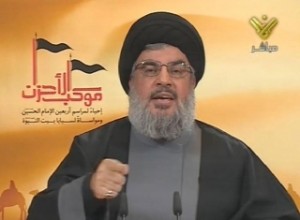 Hezbollah Secretary General Sayyed Hassan Nasrallah on Thursday called on the March 14 alliance to engage the current majority in dialogue to help build the Lebanese state. Nasrallah also said that March 14 has “declared war” on Prime Minister Najib Mikati’s March 8-led government since it was formed in July 2011.
Hezbollah Secretary General Sayyed Hassan Nasrallah on Thursday called on the March 14 alliance to engage the current majority in dialogue to help build the Lebanese state. Nasrallah also said that March 14 has “declared war” on Prime Minister Najib Mikati’s March 8-led government since it was formed in July 2011.
“Let us hold dialogue in the government and the parliament on the issues which we disagree on. It is unacceptable to diverge on one or two issues and obstruct other [matters],” he said in an address broadcast live to a graduation ceremony of women Hezbollah students.
“There are [those who say] that there is no [Lebanese] state with the presence of the Resistance’s weapons. Does this mean that social issues should not be addressed, because [of the Resistance’s arms]? This is not fair and realistic,” the Hezbollah chief added in reference to March 14.
“[On the contrary] this means [that the groups who support such arguments have commitments toward] the US and Western states.”
Nasrallah added that Hezbollah has supported dialogue efforts, including joining past national-unity governments headed by March 14 premiers.
“We disagreed on the issue of the Special Tribunal for Lebanon while March 14 rejected dialogue… Afterward we resigned,” he said in reference to March 8’s toppling of former PM Saad Hariri’s government on January 12, 2011.
However, Nasrallah added, “We are ready at any moment to join dialogue on the defense strategy and we need to be serious… We need to build a state through reason.”
President Michel Sleiman has repeatedly called for the resumption of national dialogue sessions, but March 14 figures refuse to participate in the proposed session unless it tackles the issue of Hezbollah’s arms.
Nasrallah also addressed the year-long revolts in Syria, calling for an end to bloodshed.
“Since the first day we called for militant confrontations not to take place and for everyone to embrace a political solution. We feel sad for every drop of blood shed by every human in Syria.”
He also voiced his worries that there are “threats to partition Syria,” and said that Syria’s security is interlinked with Lebanon’s.
The Syrian Observatory for Human Rights said that over 9,000 people have been killed since protests erupted in the strife-stricken country in mid-March 2011.
Now Lebanon

Leave a Reply
You must be logged in to post a comment.